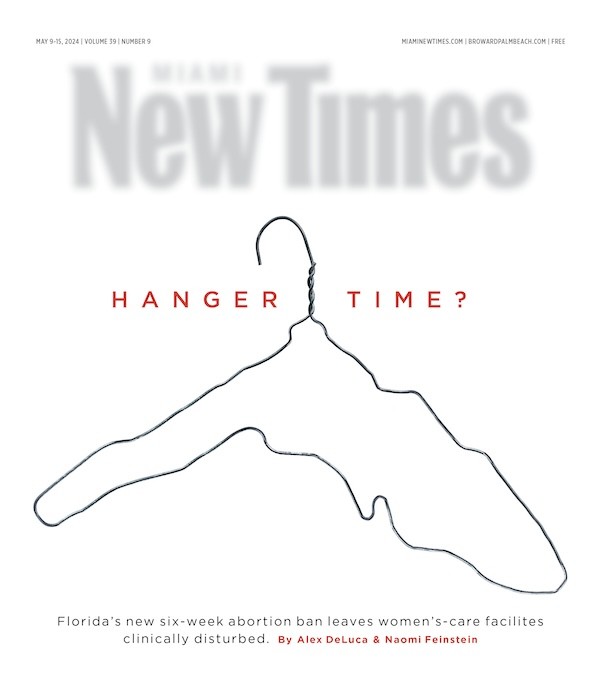At 25, Da Silva, who sports a black circle beard and just the hint of a belly, has already made a name for himself as a mainstay of the South Florida standup circuit. He performs regularly at the Improvs in Miami and West Palm, at Uncle Funny's in Fort Lauderdale, and at Coconuts in Gainesville and St. Petersburg. Tonight, though, the spotlight is on his foray, haphazard though it has proved, into the realm of publishing.
The townhouse belongs to Oscar Jimenez, 29, and his girlfriend, Michelle Rodriguez, 25, who are also partners in the Outcross venture. The fourth co-founder, 26-year-old Ruben Echeverry, couldn't make this meeting.
"Outcross is another way of saying 'hybrid,'" explains Jimenez, who, like Rodriguez, earns a steady paycheck as a Web editor for the Score Group, which bills itself as an adult entertainment site. "In biology, it's about taking two different strains of two different animals and crossbreeding them, like a dingo with a shih tzu." In terms of Outcross, "it's about crossbreeding anything entertainment and making it into one cool thing -- with an emphasis on comic books."
In the past two and a half years, however, the group has produced just two issues of the magazine, a substantial decrease from the original plan for a "quarterly anthology magazine." An unfinished Website (www.outcross.com) promises links to comics, games, reviews, interviews, and rants, as well as a streaming headline, "Coming March 10. New Store." Some of the links still aren't functional, though there are plans to relaunch the site in June.
"At the very least, Outcross is an experiment," says Da Silva, who appears to be a professional optimist, the kind of individual who might watch his car roll off a cliff and say, "I didn't want to wash it this weekend anyway." Talking to him, you'd think that everything has happened right on schedule. In fact, if this night were a segment of VH1's Behind the Music, he says, "this would be the part where everything turns around and all the struggle starts to pay off. In a few years, I will have developed a drug problem. Oscar will have come out of the closet. Ruben will have become paralyzed from a car accident. And Michelle will have left Oscar for a traveling musician. But right now is the part when things come together."
So what exactly is coming together?
The Outcross masthead is populated entirely by twentysomethings, this foursome and a number of their friends, all of whom work on the magazine for free and some of whom have already bailed out, discouraged when the final product wasn't what they expected or when the magazine didn't become an immediate sensation. "A lot of people lost heart," says Da Silva, "because our hopes and dreams weren't actualized right there, and that affected the drive to produce the magazine."
The hard-core inner group, however, remains undaunted. "Because we never published a magazine before," says Jimenez, "and none of us come from a publishing background, it's been a labor of love, more like a hobby with the potential to be something bigger."
Each issue of Outcross has been designed in two distinct sections. The front of the book features film and music reviews; interviews with local bands; and funny, pointless stories like the regular action-figure showdown, complete with photo-illustrations. In the debut issue, which appeared in the summer of 2002, a "movable" Jesus Christ action figure faced off against an "immobile" Buddy Christ in a contest to determine who was the true Savior. Buddy Christ won, Da Silva explains, because he didn't fight. "The opposable Jesus figure was too victory-hungry. Only the true Lord and Savior wouldn't raise his hand against an enemy." For the second issue -- which came out last summer -- 20th Century He-Man found himself in battle with 21st Century He-Man. Old He-Man won because of his greater "years of experience."
Issue two also featured an article on "Comic Movie Madness," co-written by Echeverry and Anna Christie Fuentes, plus an editorial by Da Silva called "Why Comics Are Cool Again" that cited notable titles from DC, Marvel, and Image comics. The cover story was an interview with Brian Michael Bendis, whom Da Silva credits as "the main writer for practically every other book for Marvel right now," including Daredevil, Ultimate Spider-Man, and Secret Wars. A photo of Bendis appears alongside the tease "The Man, The Myth, The Bald." Outcross editors know that anyone who knows anything about comics will recognize him with no introduction. Daredevil and Ultimate Spider-Man are two of the most popular comics in print; that Outcross has interviewed him gives the fledgling publication credibility. For Da Silva, who had conducted just two previous interviews, meeting his idol was a bit of a coup. Bendis was "fantastically humble," he says, and writes just the way he speaks. "If you ever watch those old 1950s movies where everybody has a quip, with deadpanned one-liners -- like the old Ocean's Eleven -- that's exactly how he talks."
Bendis: It's last year at the San Diego Con[vention], and it's my first show where things are going really well with Ultimate Spider-Man.... So, I'm doing interviews and I look to the side, and there's Julie the horny Mormon girl from The Real World. ... I catch St. Kabukiman out of the corner of my eye going, 'BEEENNNNDDDIIISSS!'.... He's drunk out of his mind, and he's coming to tackle me while I'm sitting on live TV.... Then, Julie the horny Mormon girl grabs him off camera and tackles him onto the DC comic books diamond and literally slams him on the ground and says, 'Shut up. We're on the air!'
The second half of each magazine is dedicated to black-and-white installments of comic book series written and drawn by Miami-based artists, including Jimenez, Da Silva, and Echeverry, as well as Pat Pungpee, Fernando Miranda, Omar San Cristobal, Frank Pellon, and Rafael Baddini. The comics include Brimstone Blues ("about the down-and-out life of a laid-off demon," Da Silva explains); Balance ("about reality being pulled out and people discovering there is something more"); and Incorporated, which he himself created. Only two of the artists had been published before: Pungpee's Mecca was picked up by ABC Studios, a South Florida comic book publishing house, which joined forces with A.D. Press, another regional comic book company, to publish a single comic book by Jimenez called The Promise.
Jimenez created the main cover art for the second issue: an illustration excerpted from The Liquid Sword, a postapocalyptic series relating a future during which the judicial system features gladiatorial combat and plaintiffs can defend themselves or hire a lawyer to fight for them. If they or the lawyer die, they're guilty. If they survive, they're innocent. (The strip has run in both issues of Outcross in the comics section of the magazine and will be concluded in the third issue.) On the most recent cover, a young T-shirted protagonist -- known only as "the boy" -- examines blood-soaked bandages on his hands. Loose strands of hair blow across his weary face. In the background, red-eyed, purple demons glare at him.
Diamond Comic Distributors, which bills itself as the largest worldwide distributor of English-language comics, distributed those first two issues to local stores, such as Anime Hurricane on 107th Avenue, as well as to other venues throughout the country and as far away as England, Spain, and Brazil. The inaugural issue of Outcross sold for $4.95 and ran 95 pages. Of the 6000 copies printed, just 356 were sold. "That was a reality smack across our faces," Da Silva says. "For the second issue, we printed more conservatively, and we sold the majority to orders at cons and through the Website." The price went up a dollar for the second issue, which was 96 pages long and sold about 700 copies of the 1000 printed -- a nearly 100 percent increase. (For the sake of comparison again, Blender has seen its circulation increase 110 percent since its launch in May 2001, according to an online press release.)
These numbers seem reasonable to Da Silva, who notes that success is hard to gauge at this point since there have been no other notable magazines with which to compare Outcross.
"The most recognized in comic pop culture magazines is Wizard, and that looks at comic books in terms of movies and video games, and things like that," says Barry Lyga, the marketing communications manager at Diamond Comic Distributors. "But its main focus is on mainstream comic books, whereas [Outcross] seems like it may have a more independent slant."
The co-founders have been using their own savings as well as a bank loan to underwrite their venture. For the first issue, they invested $6000 and lost about $4000. For the second issue, they invested $2000 and lost about $800.
"My worst fear," says Rodriguez, "is that we'll end up in a whole lot of debt and have nothing to show for it." Still Da Silva maintains that more people are noticing the book. "And we're more structured and determined than ever before," he adds. "We're starting to meet untapped talent."
And the townhouse Rodriguez shares with Jimenez is poised to become the new and improved headquarters for Outcross -- a sure sign of progress, since until recently the magazine's headquarters competed with all the comic-book memorabilia and other accoutrements that adorned Da Silva's bedroom in his folks' house.
Lately the co-founders of Outcross have recognized a need for change in other ways, too. "We all realized that having a good idea doesn't entitle us to anything," admits Da Silva. "We had a great idea, but we realized we might be in danger of losing it to someone else if we didn't act. It was like, 'What the hell are we doing?'
"It's like, if you created the wheel and noticed all the other square wheels getting rounder and rounder," he adds. "In time, we know that our magazine could inspire and affect people to amalgamate the features we carry. We need to let people know this came from us."
The group is selling ads (for the first time) for the third issue, which is scheduled for publication in November, at costs ranging from $450 to $2500. Three vendors have already purchased space: comic book publishers Silent Devil Press, out of Virginia; the Mystical Unicorn, an e-business, mail and phone-order company specializing in fantasy gifts, based in Alabama; and West Palm Beach's I Hero Entertainment, which aims to publish novels focusing on superhero characters. Da Silva says he hopes to secure ten to fifteen advertisers and to sell about 2000 copies. He hopes to break even with the next issue and to see a profit with the fourth.
Also for the next issue, Da Silva plans to interview Doug Stanhope, co-host of Comedy Central's The Man Show, and to recruit friends and fellow local stand-up comics -- including David Kenny, Kevin Nelson, and Matt Haffer -- to write for free.
In the meantime, the group has set for itself a reasonably attainable goal: the launch in November of a comic book called Incorporated, based on Da Silva's Outcross comic strip. It's his "unintentional opus," he says.
Incorporated is the name of a fictional detective agency that "performs other services," Da Silva explains. "Their fees are sometimes just money. Sometimes they're certain magical items. As long as you do what they want, they'll solve murder cases, find missing children. The tagline is: 'They're not the good guys, but they get the job done.'"
Incorporated is run by the Grecken family. In each generation, only one Grecken rules. At the story's onset, eighteen-year-old bisexual bombshell Ally Grecken inherits the company and recruits a new, two-person staff. In the first issue, the reader will meet handsome Henry Boyton, a cop from Orlando. "He doesn't have the best life, but it's a good life, and he's happy with it," Da Silva says. "Then something happens to his sister, and it's the first thing to slowly break down Henry's life." When Ally Grecken arrives with the means to save Boyton's sister, the cop becomes an employee.
In the second issue, due next January, Grecken hires Charlie Grass, a British cat burglar. "He's a bastard, but he's probably the most likable bastard you'll ever meet," Da Silva says. "He could push an old lady down the stairs, and then you'd look at him, and he'd give you a wink, and you'd think, 'Yeah, that was kind of funny.'"
In the third and fourth issues, Henry and Charlie begin to work on cases. Issues five and six will be expanded versions of plotlines already published in Outcross: A god offers Incorporated "anything" to retrieve something that has been stolen from him. Da Silva says that throughout the storyline, he will take mythology and religion and treat them in modern ways. "You find out that everything you've ever known about every religion or myth has been true, but the characters have had to live on since then."
Omar San Cristobal will lay out pages for Incorporated. "He draws sketches with almost no detail," Jimenez says. "Instead of details, he can do an actual storyboard as to where the story is going to go."
Frank Pellon, 21, will do what Jimenez calls "the breakdown work: facial expressions, shading, and clothing details. He'll do things like define the belt buckle and add pockets to pants."
Pat Pungpee will do the inks on the story, darkening the images and giving them depth. Pungpee has a good eye, Jimenez notes: "He'll put stuff into the panel that he sees is missing. Like one time, he inked for me, and I didn't draw the full background. In the inks, he added a car and buildings and clouds. And when he did that, he gave it a better feel to my characters talking in the foreground."
After the inking process, Jimenez himself will add color for the cover and grayscale for the inside, black-and-white pages by scanning the images into the computer and altering them using Adobe Photoshop and Illustrator.
"We'd like a minimum of 500 sales locally with the first book," he says. "Nationally, we'd like 2000 to 5000." For an indie comic book, he explains, those are respectable numbers.
One of the group's primary methods for promotion is attending comic conventions. With booth after booth of comic book collectors, stores, and artists, conventions are the showrooms of the comic industry. Occurring every spring in Orlando, MegaCon is one of the largest such conventions in the country. The Outcross creators attended in 2001 and 2002, but had to forgo the trip last year because they didn't have the funds. With a new sense of purpose, they returned to the convention last month with four boxes of Outcross back issues and went home with half, having sold roughly 240 copies. And they were on the receiving end of an interview of their own. "Stupid Sci-Fi," a Website (www.stupidscifi.com) of videos, reviews, games, and sci-fi news, features two alien puppets who crash-land on Earth and interview people involved in science fiction and fantasy. Outcross's third issue will, in turn, include an interview with the puppets.
Though Outcross has stumbled a bit in its attempts to bring its magazine to the masses, its creators are determined to move forward. "Meeting fans, getting feedback, selling books -- all of it helps keep us motivated," says Da Silva. "It's kind of like therapy, too. There's just something about seeing a 300-pound guy with a full beard and dressed as a Powerpuff Girl that makes you realize, 'My problems aren't that bad.'"










